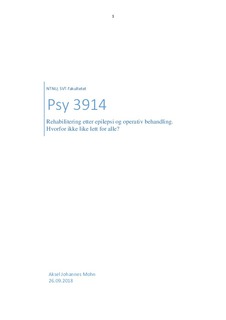| dc.description.abstract | Abstract; Epilepsy is not one disease, but a collective term for several different conditions of disease that entails the behavioral disruption of the brain. There are a variety of different causes of epilepsy, and many different types of seizures. The seizures are given form and expression of how in the brain interference occurs and can therefore have completely different expressions from person to person.
Theme and Issues; Most cases with epilepsy are being treated medically. Where the medical results are not acceptable, an epilepsy surgery is to be considered. In Norway every year, there are conducted 30 – 40 surgery. Temporal lobe resection is the most common and actual in this task. Good surgery results are showing that 60% became seizure free, and 20 – 30% approaching seizure reduction. All patients are followed for two years from national (SSE) and regional hospital. Nevertheless, several patients struggle for a long time with different challenges and need further support. Through the individual's narrative comes their own experiences and self-explanation about the past and the present clearly expressed. What was for them essential in managing a new life without epilepsy?
Problem formulation. Not equally easy for all, why? The goal in these interviews is to hear the stories of the informants of what they have been through and how this has shaped them in hindsight. What is significant in their explanation of the situation now after the accomplished treatment? Their own narrative thought and reflections about their past and present are the core in this study.
Purpose key theories/theorists; The individual's presentation of experiences related to epilepsy, surgery, and rehabilitation appear in interviews. The Burden of Normality theory by Sarah Wilson, was selected for framing difference and identifying personal focus in their narrative. The burden of normality refers to the process of adjustment required of patients as they learn to live without chronic epilepsy. Excessive levels of activity in the domains of personal exercise and sport, home duties, or work are thought to relate primarily to the need to prove oneself as ‘normal,’ after the removal by surgery of a lifelong cerebral affliction. They may also represent a need to catch up on time lost because of the epilepsy, making up for the many years in which the patient has been deprived of a “normal” life Method; Qualitative research interview, narrative and thematic analysis is here preferred to optimize at the outcome of this task.
Content; This study consists of 10 single interviews, 5 men, conducted in collaboration with professionals at a neurological clinic. All participants have past time completed temporal resection and are now medicine free and ended their neurorehabilitation, (mostly neurophysiological test and demedication). Results, the surgery treatment gave a major change in quality of life. Their primary goal was the removal of seizures and the medications. Those who did not concluded their seizure activity immediately gave a different presentation. Negative experience confronted through all aspects of treatment was arduous to process without close professional assistance. Those who had quick access to professional support and a well-established social network, showed fewer problematic challenges in their normality alignment. Close family, good colleagues, and health team with a personal touch is promoted as the most important factor for quality of life.
Conclusions and recommendations. In the case of earlier monitoring and treatment, additional damage and negative experience could be limited. Preoperative investigations should map the issues to personal mastery and self-reflection for more individual facilitation of post-operative rehabilitation. Negative experience through all parts of treatment, allows for some a deeply attachment. This also include post-operative aura experiences. A careful and close individual treatment is required. Their family also require support and motivation in their crucial participation. | nb_NO |
